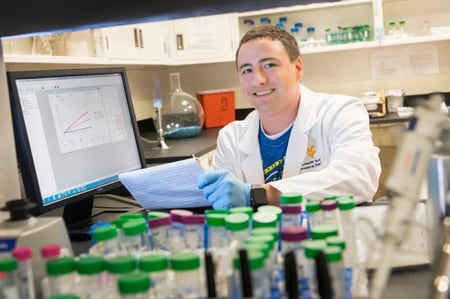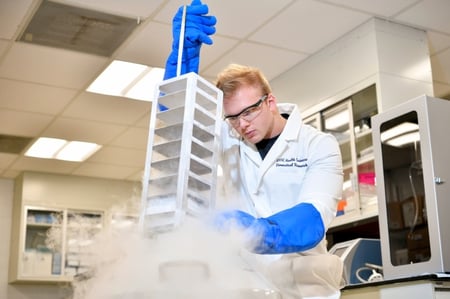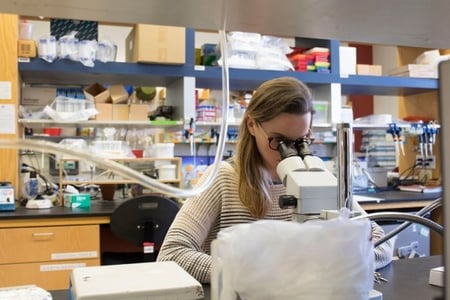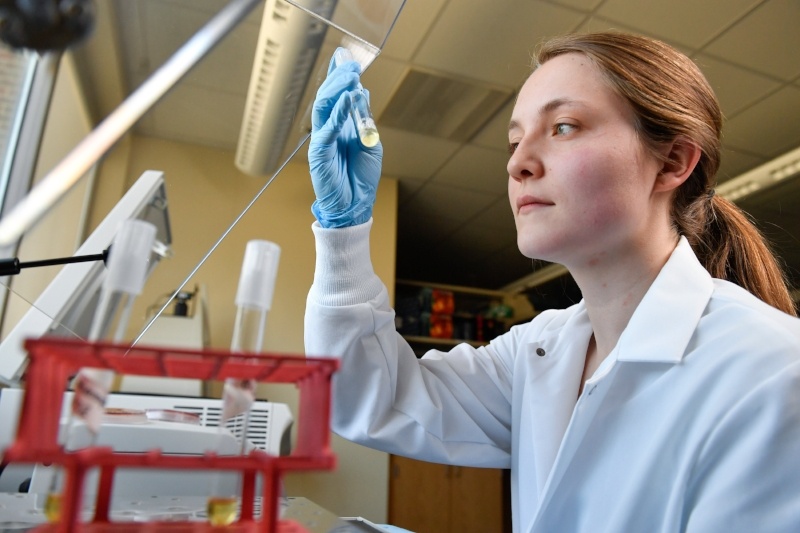
STEM: It stands for science, technology, engineering, and mathematics. Innovators educated in STEM fields are largely responsible for launching the United States as a global leader.
But due to a lack of STEM students, graduates, and leaders, there won’t be enough qualified professionals to fill the many up-and-coming STEM career positions. In fact, the Bureau of Labor Statistics (BLS) projects that there will be more than nine million STEM-related jobs available in just the next few years.
So, if you're passionate about STEM education, and if you want to establish yourself as an indispensable thought leader in your field, keep reading to learn about seven diverse graduate programs that could serve as a launching pad for your dream career. But first, let's talk a little bit about West Virginia University's dedication to research and innovation.

STEM education is where innovation is born:
West Virginia University has been ranked among the nation’s elite research institutions as reflected in the Carnegie Classification of Institutions of Higher Education. And in 2019, WVU continues to be rated as an R1 institution, or very high research activity, institution, the most elite category for research-focused schools, alongside such institutions as Harvard, Yale, Columbia and Johns Hopkins. Only 120 of the nation’s 4,500 colleges and universities attain this ranking.
“[Research] can be crucial preparation for graduate study in certain programs that will require lab work, regardless of what type of degree you are pursuing. This is particularly true in STEM fields, where deep, specialized training in equipment and materials can mean the difference between experimental success and predestined failure … Learning how to judiciously collect literature on a particular topic, how to construct a cogent research proposal, and how to do basic data analysis can help with the transition from undergraduate STEM study to the graduate level in any program.” —Raymond Lutzky, Ph.D, New York University Polytechnic School of Engineering
Because of WVU's dedication to research — especially within its STEM education programs — it's easy to see how pursuing a graduate degree in a STEM field could put you on the path to coming up with innovative solutions to some of today's most pressing issues.
So, if you want to be part of a community of driven, like-minded professionals who are passionate about STEM, consider one of the following graduate degrees rooted in STEM education.
1. Neuroscience:
The doctoral program in Neuroscience is committed to training the next generation of researchers and educators. Successful completion of degree requirements is based on research and scholarly achievement. Students will have opportunities to experience and acquire the skills needed for successful careers as independent scientists, including critical thinking, problem-solving, writing, public speaking, and leadership.

After completion of core coursework, students conduct an original research project culminating in a doctoral dissertation. Research experiences include evaluating scientific literature, identifying critical scientific issues, experimental design, grant and manuscript writing, publication of scientific papers, and presentations at national meetings.
- Additional Reading: Promoting Innovation With a PhD in Neuroscience — Raymond's Story
2. Energy Environments:
Food insecurity, businesses without sustainable practices, lack of responsible agricultural production — the world we live in is vulnerable for these reasons and so many more.
A graduate degree in energy environments is designed to prepare students with the advanced coursework, practical work, and research experience needed to succeed in professions that are rapidly developing at the intersections of energy and environment.
A graduate program in energy environments will typically offer a mix of foundational coursework in science, ethics, project management, and natural resource economics with specialized coursework tailored to the students' interests. It's a rigorous, dynamic field of study that's perfect for people who are passionate about impacting the world for good.
- Additional Reading: Studying Energy & The Environment to Make the World a Better Place
3. Landscape Architecture
Landscape architecture is the design and planning profession that applies both art and science to achieve the best use of land. West Virginia University's Landscape Architecture program prepares students to become effective professionals and citizens. This is achieved by emphasizing a philosophy of responsibility and commitment to ethical standards regarding the natural environment, professional practice, and personal relationships.

Landscape Architecture focuses on environmental design and planning and provides students with the knowledge necessary to develop the skills and abilities in design, planning, and management that are pivotal to their effectiveness and success in the workforce, and that are responsive to the unique qualities of the state and the region.
- Additional Reading: Making a Career Change to Landscape Architecture
4. Mechanical & Aerospace Engineering:
The Department of Mechanical and Aerospace Engineering offers programs in mechanical and aerospace engineering for students to earn bachelor's, master's, and doctoral degrees. Students have the option to perform research in interactive settings under the direction of our exceptional faculty. MAE focuses research primarily in the areas of aerodynamics and fluid mechanics; alternative fuels, engines and emissions; bioengineering; control, design and manufacturing; materials science; solid mechanics, materials and structures; robotics; space flight and systems; and thermal sciences.
- Additional Reading: My Experience as a PhD Student in a WVU Graduate Research Assistantship
5. Exercise Physiology
Exercise physiology is the comprehensive study of the biophysical, biomechanical and biochemical processes that contribute to movement production and disease progression. Advances in exercise physiology research have provided the foundation for human enhancement and medical treatment. The focus of the program is to promote student innovation and foster the development of independent thought. Students and faculty interact in a collegial fashion facilitating open inquiry and collaborative science.

Students entering the Exercise Physiology doctoral program have the ability to select a specialization in one of three research tracks: 1) Cardiovascular and Metabolic Diseases (CMD); 2) Muscle Pathophysiology (MPP); and 3) Rehabilitation Science and Engineering (RSE).
- Additional Reading: Quincy's STEM Story — His Intimate Research Resulting in Biomedical Discoveries and Real Innovation
6. Nutrition and Food Science
At WVU, the M.S. in Nutrition and Food Science is preparing students to tackle the health and nutrition problems many are facing today. Students will have the opportunity to work with farm and agricultural animals as well as research issues in human nutrition. Upon completion of this degree, graduates will be well equipped to begin professional careers in the field of food quality and safety assurance — or as clinical or registered dietitians.
- Additional Reading: 7 STEM Degrees for Ambitious Career Changers
7. Biology
WVU's Department of Biology offers graduate courses and research that lead to M.S. and Ph.D. degrees in the focal areas of Ecology, Bioinformatics, Genetics, Genomics and Evolutionary Biology, Biochemistry and Molecular Biology, Neurobiology, Behavior and Physiology, Plant Sciences, Cell and Developmental Biology, Biology Education and Forensic Biology. Depending on their interests, graduate students can specialize in any one of these research areas or in any combination of them.

Further, the Department of Biochemistry is home to the graduate program in Biochemistry and Molecular Biology. The goal of this graduate program is to train students to design and conduct research aimed at unraveling biochemical and molecular mechanisms controlling physiological and pathological processes. Close collaboration among scientists, the sharing of ideas, and open inquiry are critical components of our training plan.
- Additional Reading: Researching the Principles of Neuron Diversity — Kristyn's STEM Journey
Ready to transform your future with STEM education?
If you are looking to make a great investment in your future and receive a significant return on that investment, a graduate degree in a STEM field is the perfect place to start. We encourage you to contact us today to learn more about transforming your future in the field of STEM.
As someone interested in STEM education, you should explore our newest interactive resource — A Guide to Graduate Programs and Careers in STEM!


-489630-edited.jpg)






